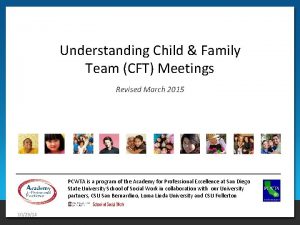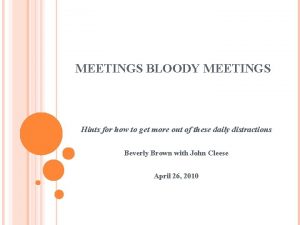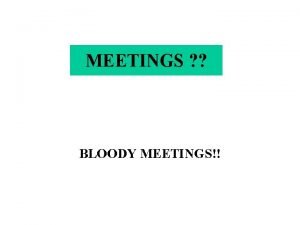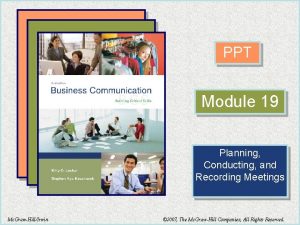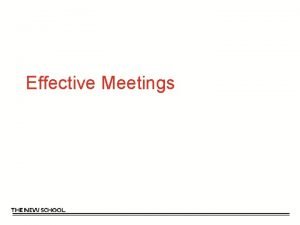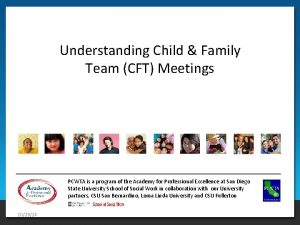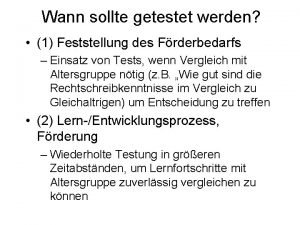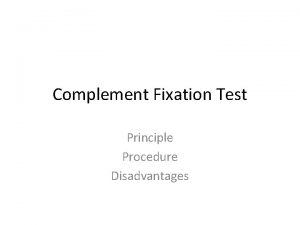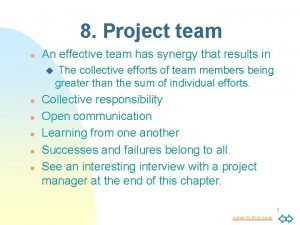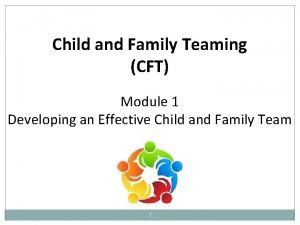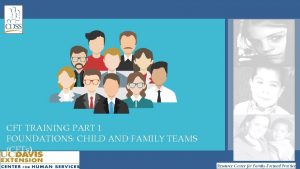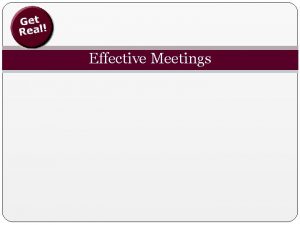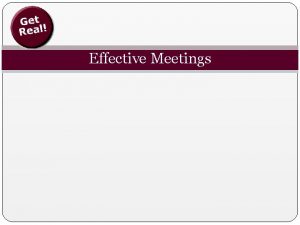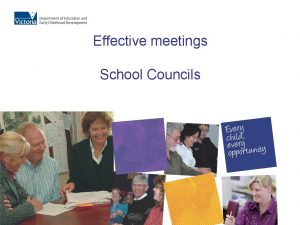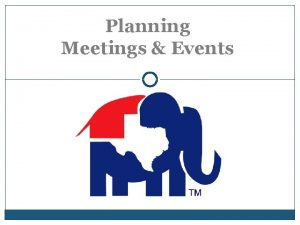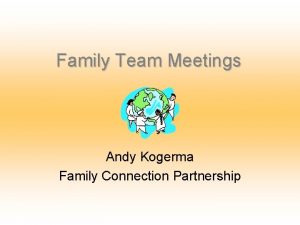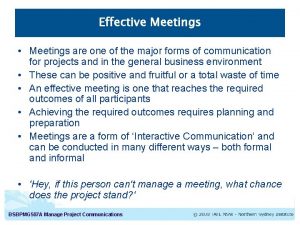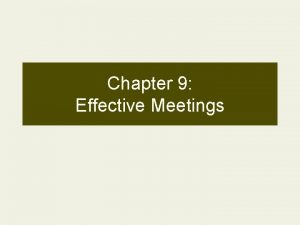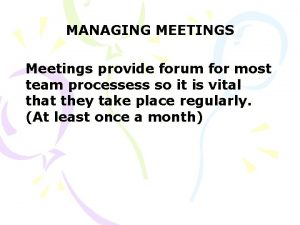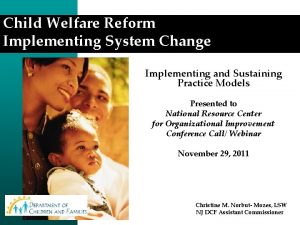IMPLEMENTING EFFECTIVE CHILD AND FAMILY TEAM CFT MEETINGS

















- Slides: 17

IMPLEMENTING EFFECTIVE CHILD AND FAMILY TEAM (CFT) MEETINGS FEBRUARY 27, 2015 County of San Diego Health and Human Services Agency Family & Youth Roundtable Amanda Lance-Sexton, Sarah Pauter, & Steven Wells

LEARNING OBJECTIVES Attendees will understand the importance of authentic family/youth engagement in implementation of a CFT meeting. Attendees will learn practical strategies to structure a CFT meeting. Attendees will learn strategies for handling CFT meeting challenges. Attendees will understand the purpose and use of the Progress Summary & Action Plan as a tool for the CFT meeting.

County of San Diego, HHSA Behavioral Health Services, Children, Youth and Families Principles of Family Youth Professional Partnership Family, Youth Professional Partnership (FYPP) is family, youth and professional partners working together, by sharing information, resources, and responsibilities. Partners are responsive to the needs, cultures, and success of each partner. A successful FYPP utilizes a multi-stakeholder approach, where there is genuine intent to achieve their common purpose. R A I S E Responsibility: Each partner Family-Youth and Professional takes ownership in the partnership by committing to be responsible for the success of the partnerships’ achievements. Agreement: The foundation of FYPP is a strong commitment from each partner to collaborate. This is demonstrated by full agreement on what is to be achieved. Each partner agrees to ensure the success of the partnership. Partners also commit to ownership in achievement of outcomes. Influence: All decisions related to achievement of outcomes are decided on together. Decisions are family centered <not service driven> and there is full understanding of each partners’ perspective and needs before decisions are made. Sharing: Each partner brings equally important knowledge and information. Partners agree that each perspective is vital to their success. Partners share their knowledge and reflect on the expertise provided to them. Excellence: To achieve excellence in FYPP there needs to be formal mechanisms in place that provide for feedback loops at all levels. Each perspective must be considered and given equal influence in decisions that affect outcomes.

The Ladder of Authentic Family & Youth Engagement was created to assist providers with objectively assessing their agencies’ and organizations’ level of Family Youth Systems Partnership as well as delineating the level of engagement they aspire to achieve. It should be noted that though the top rung, Family, Youth, and Systems Equity, is the highest achievable, it may not be attainable for all agencies and organizations. Instead, the goal should be to transcend the lower rungs of engagement and embark on those that include active participation.

PREPARATION FOR CFT MEETINGS Preparing all team members, particularly the youth and family, is a key component of effective facilitation. Preparation provides opportunity for the youth and family to express their needs, hopes, and worries about the Child and Family Team. This discussion gives the facilitator insight about how they can help support and promote youth and family voice and choice in the meeting. This discussion often sheds light on issues which may arise in the meeting and ways the facilitator can run the meeting to promote a feeling of safety amongst team members.

CFT MEETING STRUCTURE Introduction: Teaming Standards are presented Purpose and goal Concept of building on strengths Introduction of participants, roles and relationship to child/family/case Consensus vs. unanimity Group agreements for meeting Questions before beginning Identify the Situation: Explains the precipitating event/why the meeting was called Use trauma-informed approach (i. e. : Using questions like, “What happened to you vs. what is wrong with you? ”)

CFT MEETING STRUCTURE Assess the Situation: Strengths/supports Needs Family/youth perspective of situation Services involved presently and utilized in the past – All existing case plans and treatment plans are available and discussed � Past history/stressors � � Develop Ideas: Brainstorming ideas to address concern and provide safety and protection � Ensure everyone participates �

CFT MEETING STRUCTURE Reach a Decision: Scale the decision – ensure everyone has participated � Action plan developed � Timely linkage to services, priority services need immediate connection � Recap/Evaluation/Closing Everyone knows who will do what by when � Complete and copy CFT Meeting Summary �

SETTING THE MEETING AGENDA The youth is asked to set their goal for the meeting which becomes the meeting purpose and basis for discussion. The team also expresses any worries/needs or suggested agenda items. The team discusses and decides on the common goal/purpose of the meeting Any differences in agenda items/goals between the youth and the rest of the team are discussed openly in the team, and the team assures youth voice and choice is kept at the center of deciding the teams goals. The Agenda discusses issues pertaining to monitoring/adapting the action plan and preparing/planning for transitions.

TIPS FOR SUCCESSFUL ENGAGEMENT IN CFT MEETINGS Preparation before the meeting Sharing of team members’ “expertise” Leaving titles at the door Group Agreements Allowing youth and family to set Agenda

TIPS FOR SUCCESSFUL ENGAGEMENT IN CFT MEETINGS Robust discussion of youth/family strengths Focusing on needs instead of behavior Expanding conversations beyond “no. ” Utilization of professional and natural supports

CHALLENGES IN PREPARATION Engaging youth, in particular the TAY population Team members with differing “goals” for youth (e. g. bio family in conflict with foster family) Youth’s selection of team: What happens if key players aren’t included? Connecting with professional team members

KEY COMPONENTS TO MANAGING PREPARATION CHALLENGES Discussion of how to make the meeting a good fit for the youth, particularly if youth is resistant Broader goal for youth/family is made aware of and agreed on by all before initiation of the team meeting Maintain youth’s voice at center of team selection; teaming exists outside of the team meeting Alternative modes of communication- agreement on how team will communicate- and timeline for return of messages

DIFFICULT CONVERSATIONS IN THE CFT MEETING Limit setting with team members Youth/family resistance to services/ support during meeting All team members actively participate in action steps on action plan

KEY COMPONENTS TO MANAGING MEETING CHALLENGES Overt conversations by team members regarding meeting structure and how to manage derailing of meeting goals Inquiry around resistance to recommendations and/or “mandated” services Accountability is established early, in group agreements

PROGRESS SUMMARY & ACTION PLAN AS A MEANS OF ACCOUNTABILITY

FOR ADDITIONAL INFORMATION: County of San Diego, HHSA, Behavioral Health Services Amanda Lance-Sexton, LMFT, ATR – BC Amanda. Lance-Sexton@sdcounty. ca. gov County of San Diego, HHSA, Child Welfare Services Steven Wells, PSS, Residential Services Steven. Wells@sdcounty. ca. gov Family & Youth Roundtable Sarah Pauter, MPPA, Executive Youth Partner SPauter@FYRT. org
 What is a cft
What is a cft Teams
Teams Meetings bloody meetings
Meetings bloody meetings Meetings bloody meetings 5 points
Meetings bloody meetings 5 points Conducting effective meetings ppt
Conducting effective meetings ppt 4 p's of effective meetings
4 p's of effective meetings Effective meetings guidelines
Effective meetings guidelines What is a cft
What is a cft Trigonal bipyramidal crystal field splitting diagram
Trigonal bipyramidal crystal field splitting diagram Crystal field theory salient features
Crystal field theory salient features Cft 20-r auswertung t-wert
Cft 20-r auswertung t-wert Cft test procedure
Cft test procedure Crystal field effect on ionic radii
Crystal field effect on ionic radii Who being an effective team player
Who being an effective team player An effective team exhibits
An effective team exhibits Where is the ffa vice president stationed
Where is the ffa vice president stationed Ffa emblem parts
Ffa emblem parts Management issues central to strategy implementation
Management issues central to strategy implementation
